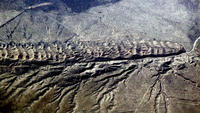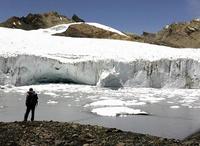-
Boston has new pot-hole weapons
In a typical year, the city of Boston fills about 19,000 potholes; the city now has two new pot-hole weapons in its arsenal: a $151,300 Pro-Patch Pothole Patcher truck, and a new iPhone and Android app, called Street Bump, which would automatically report potholes to the city by sensing when a car has hit a bump (the app has not been released yet, but test-drives are already being conducted)
-
-
Be prepared: earthquakes big and small

The February issue of the Bulletin of the Seismological Society of America offers insights into small seismic problems — and big ones — the United States faces; there were a series of small tremors in the Dallas-Forth Worth area — home to more than four million residents that has experienced no previous earthquakes in historic time; the Coachella Valley section of the San Andreas fault, between San Gorgonio Pass and the Imperial Valley, is the only portion of the fault which has not ruptured in a major earthquake during historical time; this is not good news: This long period of quiescence suggests that an unusually large amount of elastic strain has built up along the southern San Andreas segment, making it likely to produce a large to great (Mw7-8) earthquake in the near future
-
-
Hoover Dam is safe from hackers
In response to the debate over the controversial Senate Internet “kill switch” bill, the U.S. Bureau of Reclamation refuted a central argument that the law’s proponents have been using; proponents of the bill have often stated the need for the bill because terrorists could hack into the system and open the Hoover Dam’s floodgates; the dam is not connected to the Internet and has several physical and technological safeguards that prevent the floodgates from opening; the proposed bill would authorize the president to sever critical infrastructure from the Internet in the event of a cyber attack; critics say the bill could violate First Amendment rights
-
-
U.K. plans new body for the regulation of nuclear power
The United Kingdom is setting up a new nuclear regulatory body; the Office for Nuclear Regulation (ONR) would be a new independent regulator, formally responsible in law for delivering its regulatory functions and consolidating civil nuclear and radioactive transport safety and security regulation in one entity
-
-
Smart fence distinguishes real from imagined threats
A new sensor system can tell between someone simply leaning against a fence and a ne’er-do-well sneaking around; the device, developed by researchers at the University of Southern California, contains signal processing based on the way the brain works
-
-
Wind energy's dirty secret
Vast tracts of land have been turned into toxic wastelands to fuel the increasing demand for green energy; rare Earth metals like neodymium are critical components in wind turbines and electric cars, but the process to extract them is damaging to the environment; China, the world’s largest supplier of rare Earth metals, has largely ignored environmental considerations and left Inner Mongolia a widening sea of radioactive waste; the United States is currently ramping up production of rare Earth minerals, but is seeking to find more sustainable production methods; wind power still has fewer environmental repercussions than coal or oil
-
-
Controversial nuclear reactor design moving toward approval
A controversial new nuclear reactor design is moving ahead for approval by the U.S. Nuclear Regulatory Commission (NRC); the chairman of the NRC announced that the agency would open the design for public comment before deciding whether to approve the reactor; critics of the proposed reactor, a Westinghouse AP1000, believe that in the event of an accident its safety measures are inadequate; if approved, the reactor could be used in as many as fourteen nuclear power plants
-
-
Melting glaciers threaten Peru

Rising temperatures have caused glaciers in Peru to melt at alarming rates; Peru depends heavily on rivers fed by glaciers to provide drinking water, irrigation, and electricity; some scientists estimate that in ten years, whole glaciers will disappear entirely from the Andes; millions of Peruvians depend entirely on the glacier fed rivers as their primary source for water; the United States fears that water, food, and power shortages in Peru could cause stability and spark conflict across the region
-
-
Counterterror laws hobble monitoring of water supplies
Laws designed to protect the U.S. water supply are making it difficult for communities to maintain proper oversight over water companies and their use of water; the DHS has evidence that al Qaeda was looking to disrupt or contaminate the U.S. water supply; environmentalists who are concerned over water shortages or resource usage are having difficulty obtaining any information; officials admit that the laws are clumsy and are currently reviewing a system to make more data publicly available while protecting sensitive information like the location of wells
-
-
Sector Report for Monday, 7 February 2011: Infrastructure protection
This report contains the following stories.
Plus 1 additional story.
-
-
Protecting vital infrastructure as sea levels rise
As the world gets warmer, sea levels are rising; it has been happening at a snail’s pace so far, but as it speeds up more and more low-lying coastal land will be lost; at risk are many of the world’s cities and huge areas of fertile farmland; the sea is set to rise a meter or more by the end of this century, swamping much vital infrastructure and displacing hundreds of millions of people; scientists are looking at various ways to slow down or reverse the rise in sea levels — and of ways of coping with its consequences
-
-
Asia faces climate-induced migration crisis
Asians accounted for 89 percent of the 207 million people affected by natural disasters globally last year; Asian governments are currently focused on mitigating weather changes induced by climate change, but a new report from the Asian Development Bank says they should start laying down policies and mechanisms to deal with the projected population shifts; weather changes such as significant temperature increases, changing rainfall patterns, greater monsoon variability, sea-level rise, floods, and more intense tropical cyclones would force millions of people to flee their homes to safer havens within countries and across borders
-
-
Egypt's Internet blackout revives U.S. "kill switch" debate
Egypt’s five-day shutdown of the Internet has revived debate in the United States over how much authority the U.S. president should have over the Web in the event of a crisis; a bill pending before Congress would give the president the authority to shut down parts of the Internet in the event of a national security crisis such as a sustained enemy cyberattack on the U.S. national grid or financial systems; critics say this is a threat to civil liberties; “It’s not an Internet kill switch,” says one cyber expert; “But you can think about isolating certain domains or certain enterprises; say a big power company gets infected— You say to them, ‘Disconnect yourself before you infect other power companies’; It’s like an avian flu quarantine for the Internet”
-
-
U.K. to impose hefty clean-up bill on nuclear power
U.K. energy and climate change minister Christopher Huhne last week made nuclear energy in the United Kingdom a whole lot less attractive; the liability for clean-up in case of a nuclear accident is currently limited to 140 million Pounds; the EU has proposed increasing this to 600 million Euros (507 million Pounds); Huhne wants to raise it to 1 billion Pounds (1.2 billion Euros).
-
-
Nearly half Bhutan's schools lack access to sufficient water
238 of Bhutan’s 576 schools lack sufficient water supplies; water shortages disrupt education as children must spend time that could be spent learning fetching water from streams; children are also falling sick due to poor hygiene and sanitation as a result of limited access to water; unsafe drinking water is one the second leading cause of death in the world and poses a serious public health risk to these children; water sources in Bhutan are dwindling as glaciers recede making it difficult to provide schools with water
-
More headlines
The long view
Falling Space Debris: How High Is the Risk I'll Get Hit?
An International Space Station battery fell back to Earth and, luckily, splashed down harmlessly in the Atlantic. Should we have worried? Space debris reenters our atmosphere every week.
Using Drone Swarms to Fight Forest Fires
Forest fires are becoming increasingly catastrophic across the world, accelerated by climate change. Researchers are using multiple swarms of drones to tackle natural disasters like forest fires.
Strengthening the Grid’s ‘Backbone’ with Hydropower
Argonne-led studies investigate how hydropower could help add more clean energy to the grid, how it generates value as grids add more renewable energy, and how liner technology can improve hydropower efficiency.
LNG Exports Have Had No Impact on Domestic Energy Costs: Analysis
U.S. liquified natural gas (LNG) exports have not had any sustained and significant direct impact on U.S. natural gas prices and have, in fact, spurred production and productivity gains, which contribute to downward pressure on domestic prices.
